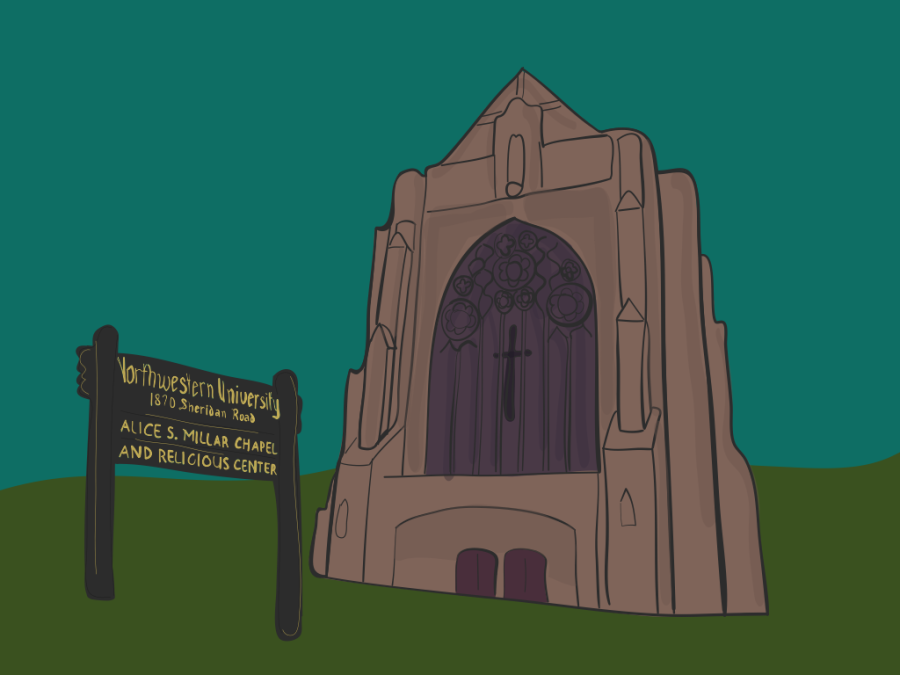‘Gays and Gospel’ event honors Black and queer gospel singers
Daily file illustration by Angeli Mittal
Attendees clapped and danced during the “Gays and Gospel” event in the Alice Millar Chapel Tuesday, while listening and learning about multiple Black and queer gospel artists.
October 12, 2022
The sound of drums, piano chords, clapping hands and vocal riffs filled the Alice Millar Chapel on Tuesday during the “Gays and Gospel” event.
School of Communication Dean E. Patrick Johnson and Communication Prof. Kent Brooks, director of Religious and Spiritual Life, led the special lecture and performance honoring Black queer gospel singers from the past and present.
“We are especially honored to host this collaboration between the School of Communication and the Office of Religious and Spiritual life,” University chaplain the Rev. Kristen Glass Perez said during the event.
Johnson spoke about multiple gospel artists throughout the event, providing profiles of Thomas Dorsey, Rosetta Tharpe, Willmer “Little Ax” Broadnax, James Cleveland, Sylvester, Yvette Flunder and Tonéx. Johnson said except for Tonéx, these artists had to hide their queerness in order to be accepted into the gospel music community.
Johnson and Brooks performed with a student band after each profile, presenting each artist’s music. Some songs included “It’s a Highway to Heaven” by Dorsey and “Make Me Over” by Tonéx.
The band was comprised of vocalist and Bienen junior Olivia Pierce, lead guitarist and Bienen senior Shanth Gopalswamy, bass guitarist and Bienen senior Jesse Lear and drummer and Weinberg junior Jack Shurtleff. Pierce and Brooks were the lead singers for most of the songs performed. But Johnson also sang and even performed a solo in falsetto when the band performed “You Make Me Feel (Mighty Real)” by Sylvester.
Following the artist profiles, Johnson and Brooks shared their own experiences in church and gospel spaces.
Johnson told the crowd he learned how to express his queerness in his church in rural Western North Carolina as a child. He said he felt comfortable expressing himself in that space.
“I was a fat boy with a high butt and a big voice who had a chance to shine every Sunday,” Johnson said.
Johnson said he was able to push the confines of gender in the church through costume, such as a choir or preacher’s robe. He then proceeded to dance through the rows of the chapel to music played by the band and a beat contributed to by event attendees.
Brooks spoke of his first real Gospel hero, his brother Larry Brooks. He said his brother was a prodigy who thrived in the spotlight and was a regional celebrity in North Carolina.
Brooks said his brother decided to come out to their family as a freshman in college.
“I like to think that music provided Larry a balanced way to do that,” Brooks said.
Brooks sang a tribute to his brother, “Precious Lord, Take My Hand” by Thomas Dorsey. The performance was very emotional for him, he said.
Organizers were also keen to acknowledge the significance of the day on which the event occurred.
“On National Coming Out Day, (we) affirm and acknowledge the cultural impact of a history of LGBTQ+ people who have stood proudly and openly inside their homes,” Johnson said.
Email: [email protected]
Twitter: @PavanAcharya02
Related Stories:
— Podculture: ‘I can be happy and trans’: Queer students find joy in music
— ‘You won’t break my soul’: Religious and Spiritual Life hosts Beyoncé Mass












